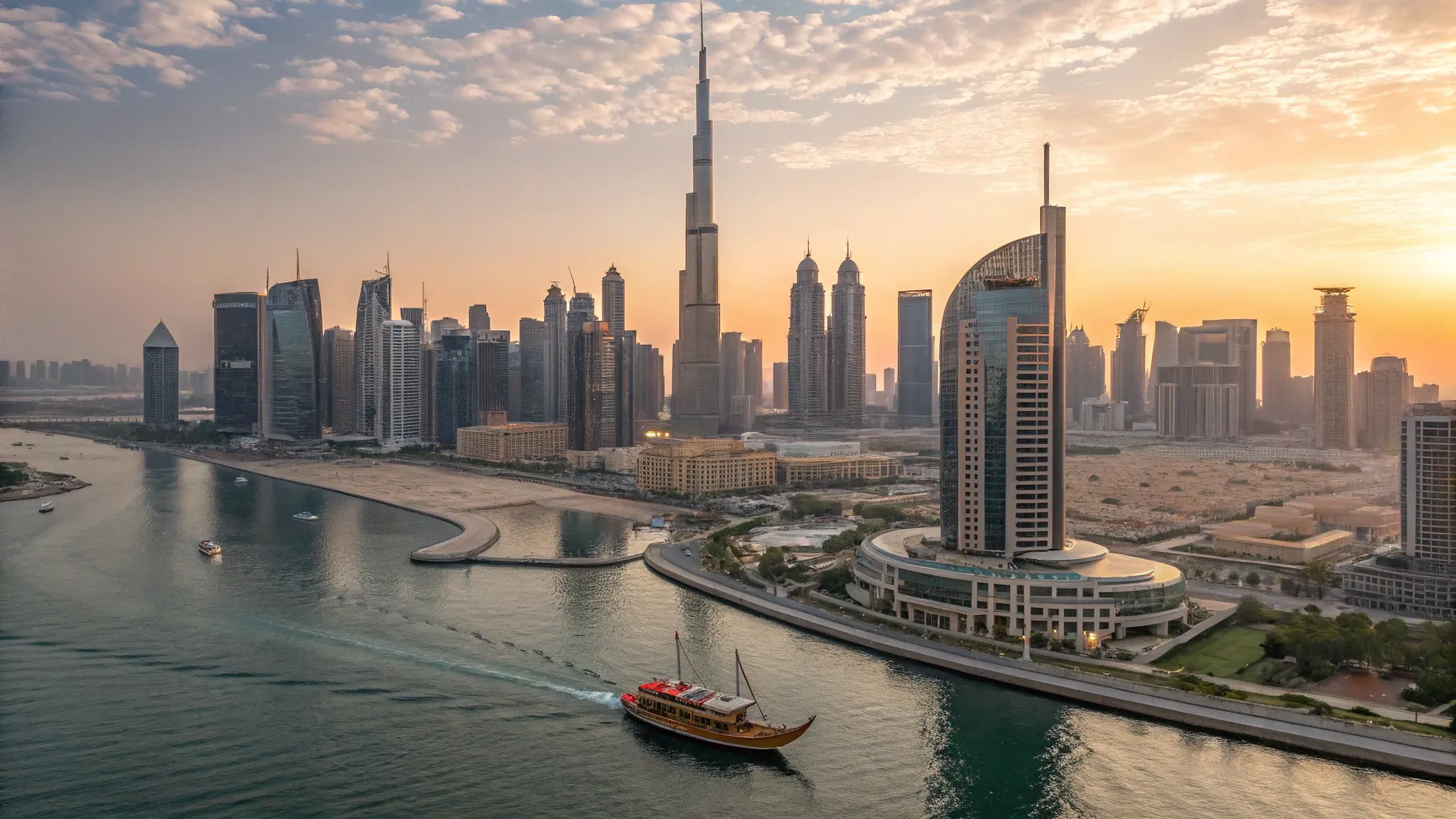- Blog
- moving to dubai from uk guide
Moving to Dubai from the UK: The Ultimate 2026 Guide

Discover how to move to Dubai from the UK in 2026. This guide covers visas, tax-free living, cost comparisons, shipping logistics, and business setup tips.
Founder of JustMove
Summarize content with
Get AI-powered insights and summaries of this article
Just Move is the preferred partner of entrepreneurs
Expert in incorporation, accounting and immigration
Trusted by over 500+ entrepreneurs
4.9/5 reviews from our clients
100% satisfaction across all services
Content
For many British entrepreneurs, the idea of trading gray skies for a world of boundless opportunity is no longer just a distant dream. This moving to dubai from uk guide is specifically designed for startups, SMEs, and investors who are ready to establish a footprint in a premier global business hub.
With over 240,000 British expats already calling the city home, the transition to the UAE is well-trodden. This established community of around 240,000 British nationals ensures a familiar support network as you navigate living in the united arab emirates. Moving to dubai from uk in 2026 represents a strategic choice for those seeking a high-quality lifestyle paired with unparalleled commercial growth.
This guide provides a roadmap for professionals relocating to dubai, covering everything from residency visas to the 2026 e-invoicing compliance rules. Whether you are a freelancer or a scaling enterprise, you will discover the most effective ways to manage your money and operations in the United Arab Emirates.
We solve the common frustrations of international relocation by breaking down the legal and logistical requirements of a move to dubai. By the time you finish this guide to moving to dubai, you will have a clear understanding of the costs, timelines, and tax benefits awaiting you.
Establishing a presence in such a dynamic market requires careful planning and a deep understanding of the local landscape.
Why Move to Dubai in 2026? Benefits for UK Expats
Starting a new life in the United Arab Emirates represents more than just a change of scenery; it is a strategic move for those dreaming of exponential growth. For any Briton reading this moving to dubai from uk guide, the primary draw remains the legendary financial efficiency and quality of life the city offers.
Financial Advantages: A Comprehensive Guide to Moving to Dubai Tax-Free
The most immediate benefit of moving to dubai from uk is the radical shift in your personal balance sheet. Dubai has a zero income tax policy, which stands in stark contrast to the high-income tax brackets found in London or Manchester.
This fiscal environment means Dubai imposes no personal income tax on its residents, offering tax efficiency for expats that is simply unattainable at home. When you relocate to dubai, you are effectively choosing a path where you keep every penny of your hard-earned salary. For a comprehensive understanding of tax regulations, including business taxation, you can refer to our Corporate Tax Guide UAE.
This tax-free income for residents provides entrepreneurs with significant amounts of capital to reinvest into their ventures. You can use these extra funds specifically for business expansion or enhancing your family’s quality of life in a way that feels boundless.
Unrivaled Safety for Expats in Dubai
Safety is often a secondary thought until you experience the peace of mind offered by the UAE. Dubai is generally considered one of the safest places in the world to live, with very low crime rates compared to other developed nations.
Whether you are walking home late or managing a physical storefront, the level of security here is a major point of attraction. For British families, living in the united arab emirates offers a secure environment that promises a better upbringing for children.
A Future-Proof Economy Beyond Oil
Many professionals believe the region is still dependent on petroleum, but the economic reality is far more diverse and effective. Dubai's GDP is less than 1% oil-based, having diversified into real estate, construction, trade, financial services, and tourism.
This diversification makes the city a sustainable choice for those looking to move to dubai for the long haul. The government has successfully pivoted toward a world-class tech and finance hub, creating a stable platform for startups and SMEs. This helpful geographic advantage makes Dubai from the UK a logical step for those looking to scale.
Key Drivers for Relocation: Zero Personal Tax: You retain 100% of your earnings. Global Connectivity: Access a world of markets within an 8-hour flight. Unmatched Security: Benefit from a city with world-leading safety statistics. Modern Infrastructure: Utilize state-of-the-art office spaces and digital government services.
Establishing your presence in this thriving metropolis requires more than just a visa; it requires a grasp of the administrative landscape. Understanding the specific legal frameworks available will help you determine the best path for your enterprise.
Understanding Visa Options and Residency
Navigating the legal landscape is the most critical step for anyone using this moving to dubai from uk guide to plan their transition. While the dream of a boundless global market is enticing, your arrival must be anchored in the correct legal framework to ensure long-term success.
Currently, UK passport holders receive a 30-day visa on arrival in Dubai, but the passport must be valid for at least six months. This entry permit is helpful for initial scouting trips, yet it is not a substitute for the mandatory residency permit required for living in the united arab emirates.
To move to Dubai from the UK, you need a residence visa that aligns with your professional activities. This document transforms you from a visitor into a legal resident, allowing you to open bank accounts, lease property, and access local services. For those seeking long-term stability as investors or exceptional talents, a detailed guide to the Golden Visa UAE is available.
Visa Options for Relocating to Dubai from the UK
The UAE government has streamlined entry requirements to attract global talent and investment. There are four main visa types for UK expats moving to Dubai: Work visa, Remote work visa, Green visa, and Golden visa. Each serves a different strategic point for your business or career.
Work Visa: This is the standard route for most individuals moving to dubai from uk who are either employed by a local company or setting up their own enterprise. Just Move specializes in this category specifically for entrepreneurs, managing the license issuance and full company formation process in as little as 1–5 business days. We can help you launch your business in Dubai seamlessly.
Remote Work Visa: The UAE has a new remote work visa that allows individuals to live and work in Dubai for one year while maintaining employment elsewhere. This works by providing a bridge for those dreaming of a new lifestyle without immediately shifting their entire corporate structure.
Green Visa: This option is designed for highly skilled employees, freelancers, and investors. It offers a five-year residency without requiring a local sponsor, which is effective for maintaining autonomy while building a presence in the Middle East.
Golden Visa: This long-term residency lasts for ten years and is granted to significant investors and exceptional talents. It provides a stable foundation for those committing large amounts of capital to the UAE economy or bringing world-class expertise to the region.
Just Move facilitates this transition by preparing as much as possible before your arrival. While the total setup for a license, visa, and banking typically takes under 30 days, our team can help you obtain your residency in only one week once you arrive for your medical visit and biometrics.
It is also important to consider your tax residency status when move to dubai for the long term. Under the 90-day rule, you can often qualify for a Tax Residency Certificate if you hold a valid visa and a permanent place of residence, such as a leased apartment or owned property.
Choosing the correct residency path is the first step toward unlocking the financial and lifestyle promises of the region. Once your residency is secured, the focus shifts to the structural foundation of your professional presence in the city.
Relocation Logistics: Shipping and Freight from the UK
Relocating your physical life is a logistical milestone that defines your transition to the United Arab Emirates. While Just Move handles your digital residency and business setup, you must decide how to transport your assets across the world. This moving to dubai from uk guide simplifies the choice between speed and budget for those dreaming of a boundless professional future.
Evaluating Sea and Air Freight in Your Guide to Moving to Dubai
Sea freight is the most effective method for families or entrepreneurs moving an entire household. Shipping a 20ft container of used furniture from London to Dubai costs approximately £3,154 and takes 3-4 weeks. This timeline works well if you have temporary accommodation arranged somewhere in the UAE while awaiting your shipment.
Air freight serves as a helpful alternative for those needing essentials immediately to start living in the united arab emirates. Air freighting 250 kg of household goods from London to Dubai costs approximately £1,254 and takes 1-2 days. It allows expats in dubai to hit the ground running without waiting a month for their belongings to arrive.
Strategic Logistics for a Successful Move to Dubai
Your decision hinges on the total volume of goods and the urgency of your relocation. If you are a minimalist freelancer, air freight saves money by avoiding port storage fees and long-term rental of essential items. However, established business owners moving to dubai from uk with large amounts of inventory will find sea routes more economical.
Sea Freight: Best for high-volume shipments including heavy furniture and motor vehicles. Air Freight: Optimal for smaller shipments under 300kg and time-sensitive business equipment. Shared Containers: A cost-effective middle-point where you pay only for the space your goods occupy.
Ensure all your paperwork, including the 2026 mandatory proof of address like a utility bill, is ready before your goods reach the uae. Having a clear inventory list prevents delays during customs clearance for shipments arriving in dubai from the uk. Proper planning ensures that the promises of a seamless lifestyle are met from the moment you land.
Once the heavy lifting of your physical relocation is underway, your focus must return to the administrative foundations required to sustain your new life in the city.
Cost of Living: Dubai vs. the UK
Using a moving to dubai from uk guide is the most effective way to understand how your monthly budget will shift when transitioning from the British economy to the United Arab Emirates. While many entrepreneurs worry about the high-end reputation of the UAE, the reality for most expats is a significant increase in purchasing power.
The cost of living in Dubai is generally lower than in the UK, except for rent. For those relocating from the capital, the financial relief is even more pronounced, as the cost of living in Dubai is 26.2% lower than in London. When compared to other global hubs, Dubai is 15.7% lower than Paris and 42% lower than New York, making it an attractive point for international business.
Real Estate and Property in Your Moving to Dubai from UK Guide
Finding a place to live is the most significant financial decision you will make when moving to dubai from uk. While rental prices in prime areas can be high, the investment market offers world class value for those dreaming of long-term stability. The average property price in Dubai is £612,300, while the average apartment price is £383,493.
These property values often provide much more space and luxury than similarly priced options in somewhere like London or Manchester. Most modern buildings in the UAE include amenities like swimming pools, gyms, and 24-hour security as standard features. This makes the amounts spent on housing feel like a more comprehensive lifestyle investment rather than just a roof over your head.
Managing Daily Expenses and Lifestyle Costs
Daily life for expats in Dubai offers several areas where money goes much further. Beyond the absence of personal income tax, which is a major factor when you move to dubai, the costs of services and logistics are surprisingly helpful for maintaining a high standard of living.
- Utilities and Transport: While cooling costs can rise in the summer, fuel prices remain lower than in the UK, making vehicle ownership very affordable.
- Dining and Services: The city offers a boundless range of options, from budget-friendly street food to Michelin-starred restaurants, catering to all income levels.
- Tax Advantages: Living in the United Arab Emirates allows you to keep 100% of your personal income, which is a transformative change for those used to UK tax brackets.
This guide to moving to dubai highlights that while your outward "sticker price" for rent might be higher, your net disposable income usually increases. By working with Just Move to handle your business setup digitally, you can focus your financial resources on settling into your new home.
Understanding these fiscal dynamics is only the first step in ensuring your transition to the city is both profitable and sustainable.
Healthcare, Tax Treaties, and Cultural Integration
Navigating the final administrative hurdles is a pivotal point in any moving to dubai from uk guide. While the physical move to Dubai from the UK involves logistics and shipping, your long-term success depends on understanding healthcare, tax protection, and social integration. These pillars ensure that your transition into the United Arab Emirates is as smooth as your business setup.
A Helpful Guide to Moving to Dubai: Health and Visa Essentials
One of the most critical adjustments for those moving to Dubai is the healthcare transition. The UAE does not have a reciprocal health agreement with the UK, making comprehensive health insurance essential for covering healthcare costs. Unlike the NHS, the system here relies on private providers, and having the right policy is a mandatory requirement for your residency.
The visa process itself works by requiring a series of medical checks that every expat must pass. Applying for a residence visa requires a blood test for diseases like hepatitis, HIV, and tuberculosis; a positive result leads to deportation. This strict policy ensures public health standards remain high across the city for all residents and business owners.
Protecting Your Money with Double Taxation Agreements
For entrepreneurs and investors, protecting your hard-earned amounts of capital is a top priority. Relocating to Dubai promises significant fiscal advantages, but you must ensure you are not taxed twice on the same income. This protection is effective because the UAE has double taxation agreements (DTAs) with over 100 countries, including the UK and Australia, to mitigate double taxation.
These treaties are helpful for maintaining your global financial interests while living in the United Arab Emirates. While you enjoy 0% personal income tax locally, these agreements provide the legal framework to ensure the UK's HMRC recognizes your new tax status. It is always wise to obtain a Tax Residency Certificate (TRC) if you plan to spend more than 183 days in the country to solidify this protection.
Cultural Integration for Expats in Dubai
The social landscape of the city is a boundless mix of global influences. More than 90% of Dubai's 3.8 million citizens are expats, meaning you are entering a community where almost everyone has a shared history of relocation. This multicultural environment makes it easier to find your place somewhere in the professional or social circles of the city.
Success when you move to Dubai often comes down to respect and adaptation. While the city is incredibly modern, it remains rooted in Islamic traditions. Understanding local customs regarding dress and public behavior is a vital part of your guide to moving to Dubai. This cultural awareness, combined with a professional setup from Just Move, allows you to focus on the dreaming phase of your business growth.
Once your legal and social foundations are in place, the next step involves securing your physical presence in the city.
Frequently Asked Questions
Is it easy for Brits to move to Dubai?
Brits find it easy to move to dubai because of the high concentration of expats in dubai and the streamlined visa-on-arrival process for UK passport holders. While the initial 30-day entry is simple, long-term success requires a formal residency structure through employment or business setup. This moving to dubai from uk guide provides an effective roadmap for navigating these administrative steps to ensure a smooth transition into the United Arab Emirates.
How much money do you need to move from the UK to Dubai?
Relocating to Dubai typically requires an initial capital of £5,000 to £10,000 to cover international shipping, housing deposits, and visa processing. You must allocate money for shipping services, which generally start at £3,000, alongside mandatory setup costs for your business or residency. Following a guide to moving to dubai helps you track these expenses while ensuring compliance with 2026 rules, such as the mandatory e-invoicing rollout starting in July.
Is $100 a day enough in Dubai?
A budget of $100 per day is enough to cover your daily lifestyle needs like food, entertainment, and transportation when moving to dubai. This amount is sufficient for mid-range living, though it excludes major fixed costs like private schooling or annual rent. When moving to dubai from the uk, understanding that your purchasing power increases in the uae is a major point of consideration for most entrepreneurs relocating to dubai.
Can I register my business before arriving in the UAE?
You can register your business remotely through Just Move’s digital-first platform in as little as 1 to 5 business days. This allows you to handle the moving to dubai from uk transition efficiently by securing your trade license before you even step foot in the united arab emirates. By completing the paperwork online, you minimize the time spent on administrative tasks, allowing you to focus on the strategic growth of your new venture.
Mastering these foundational details is the key to thriving while living in the united arab emirates as you prepare to secure your permanent home.
Starting Your Dubai Journey with Confidence
Relocating to Dubai offers a world of boundless opportunities for those dreaming of tax-efficient growth and a premium lifestyle. This moving to dubai from uk guide has outlined the essential steps, from securing residency to navigating the 2026 UAE tax landscape. Living in the United Arab Emirates provides expats in Dubai with a strategic base to scale businesses globally while enjoying 0% personal income tax.
Successfully moving to Dubai from the UK requires a clear roadmap and expert local knowledge. This guide to moving to dubai highlights that staying compliant with new 2026 e-invoicing and corporate tax rules protects your investment. By prioritizing an effective setup, you save time and money during your transition.
Just Move provides a helpful, 100% digital solution to streamline your journey. Our team handles company formation and visa processing, with registration taking as little as 10 minutes online. If you are ready to move to Dubai and need expert assistance, start your Dubai company formation process today for professional guidance on establishing your new life in the United Arab Emirates.
Founder of JustMove
Kasia is a renowned expert in business setup and relocation services in Dubai. With a proven track record as a top-performing account executive at PayPal and co-founder of luxury concierge service Alotea, she brings a wealth of experience to her role at JustMOVE. Kasia's deep understanding of the UAE market, extensive international connections, and multilingual capabilities (English, Polish, Russian, and French) make her an authority in navigating the complexities of business setup and relocation. Through the JustMOVE blog, Kasia shares her insights and practical advice to help entrepreneurs and families establish and grow their presence in the UAE. Her commitment to delivering personalized, transparent, and efficient solutions has earned her the trust of countless clients.
Check out more related articles

By Kasia

By Kasia
![Moving to Dubai from the US: Your Complete Guide [2025]](https://media.justmovedubai.com/Moving to Dubai from the US Your Complete Guide [2025].webp)
By Kasia

By Kasia

By Kasia

By Kasia